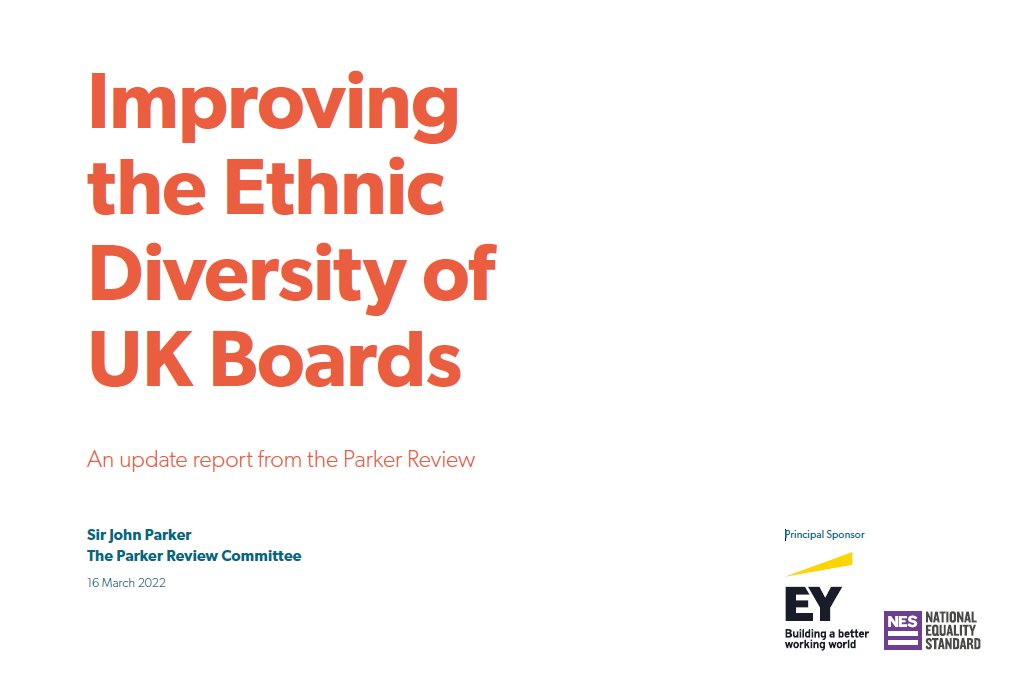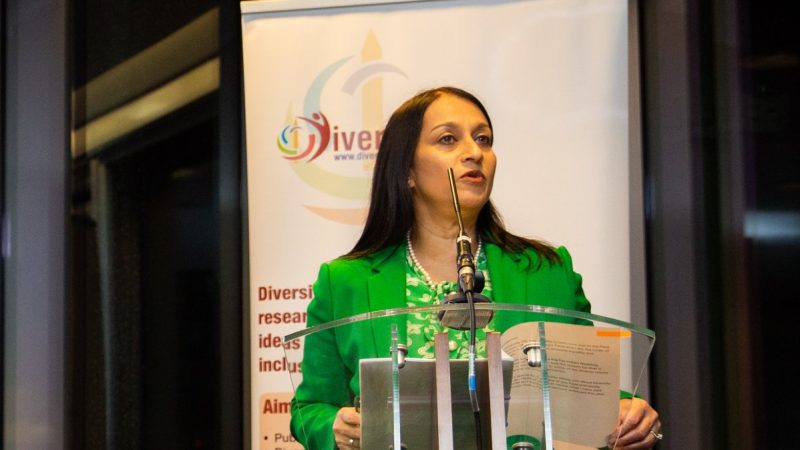Nearly all FTSE 100 companies have met Parker Review’s target

The Parker Review committee has published the results of its latest voluntary census on the ethnic diversity of FTSE 100 and FTSE 250 companies' boards, carried out jointly with the Department of Business, Energy & Industrial Strategy (BEIS).
The voluntary census showed that 89 FTSE 100 companies had minority ethnic representation on their company boards as of 31 December 2021, the target date. Another 5 FTSE 100 appointments have been announced since then and an additional 3 companies are at an advanced stage in the recruitment process. Of the 3 companies which have not signalled their commitment, one is being acquired by a US Group and will de-list; another is a Russian steel and mining company which will shortly be removed from the FTSE100 index; and the final one is a UK subsidiary of a US based Group.
"One by 2021" target for all FTSE 100 boards
In 2017, the Parker Review made a series of recommendations and set a "One by 2021" target for all FTSE 100 boards to have at least one director from a minority ethnic background by December 2021.
The Review also set a similar "One by 2024" target for all FTSE 250 boards. At December 2021, 128 FTSE 250 companies had at least one director from a minority ethnic background, representing 55% of companies that responded.
Slow progress of ethnic representation in key Executive Director positions
As expected, the overwhelming majority of these Board positions are Non-Executive Directors given that FTSE companies generally only have 2 Executive Director positions - CEO and CFO. Progress continues in these key Executive roles but at a relatively slow pace. Only 6 CEOs across the FTSE 100 come from a minority ethnic background and 16 minority ethnic CEOs lead FTSE 250 companies. There are even fewer Chairs from a minority ethnic background: 3 in the FTSE 100 and 5 in the FTSE 250.
The Parker Review recommends that continued attention is focused on this issue and believes that this – together with the growing experience of many recently appointed minority ethnic Non-Executive Directors - will help generate growth in the number of minority ethnic directors in the most influential roles around the Boardroom table. This is what has happened with women directors in recent years and we anticipate a similar trend with minority ethnic directors.
Increased attention now being paid to ED&I in British business
All FTSE 100 companies responded to the voluntary census, demonstrating the increased attention now being paid to diversity, equity and inclusion in British business. 233 FTSE 250 companies responded which is a significant improvement from the last time they were surveyed.
The Steering Group was established in 2015/16 and has been led by Sir John Parker during this period. Now that the first major milestone has passed, Sir John Parker has decided that it is an appropriate time for David Tyler, co-Chairman of the Committee, to assume the lead Chairman role for the remainder of the Review.
Sir John Parker, Chairman of the Parker Review Committee, said: "Our December 2021 target of every FTSE 100 Company having at least one Board director from a minority ethnic background has very nearly been met. We have also secured commitments from many of the outstanding companies which mean it is likely that c.97% of current FTSE 100 companies will comply with the target by the middle of the year. FTSE 250 companies also continue to make good progress; with three years to go on their target, over half have people from minority ethnic communities in their boardrooms.
"This milestone year showcases the extraordinary sea change within listed companies regarding diversity and inclusion. The progressive leadership in FTSE Boardrooms deserves our congratulations and fulsome praise for their positive response to a range of initiatives over the past decade including this Review. Their success places UK listed companies at the forefront of global governance, gender and ethnic diversity. This will be a winning combination in a competitive world with fast-changing demographics."
Kwasi Kwarteng MP, Secretary of State for Business, Energy & Industrial Strategy, said: "We want to foster a business environment in the UK where people have equal opportunity to succeed and progress in their career through merit and ability, rather than their ethnic background.
"While there is still more to do, today's findings demonstrate the great strides being made - particularly at FTSE 100 level - to increase ethnic diversity on boards, as more of Britain's biggest companies recognise the business case for diversifying their teams so that they better reflect the society we live in."
David Tyler, co-Chairman of the Parker Review Committee, added: "These numbers compare starkly and very favourably with the position in 2017 when only 51% of FTSE 100 companies had people from minority ethnic communities in their boardrooms.
"However, companies should not think of the Parker Review targets as 'one and done'. We hope companies will follow the most diverse of their peer group and expand the scale and depth of initiatives fostering inclusion and diversity right through organisations to help develop the next generation of talent.
"We are very grateful to Sir John for his inspired and purposeful leadership of the Review since it was initiated in 2015."
Arun Batra, EY Partner, CEO of the National Equality Standard and adviser to the Parker Review added: "I'm proud of the fantastic progress we've made in the FTSE 100, and all this despite the impact of COVID-19 on recruitment processes. Now, our attention focuses on the FTSE 250, who should prioritise diversifying their boards before the 2024 deadline. Your actions will be critical for both business and the wider society in our ambition to create a more inclusive and prosperous world."
As of 31 December 2021, Parker Review census results (all FTSE 100 responded):
- 89 FTSE 100 companies had minority ethnic representation on their boards (Dec 2021), compared to 74 in November 2020.
- Since the census in December 2021, another 5 FTSE 100 companies have announced the appointment of minority ethnic directors to their boards, effective in the first half of 2022.
- A further 3 FTSE 100 companies have also committed to the Parker Review target and are at an advanced stage in the recruitment process
- Women comprise 49% of the minority ethnic directors on FTSE 100 boards.
- c.16% of all FTSE 100 board positions are held by minority ethnic directors (164 out of the 1,056 director positions).
- All FTSE 100 companies responded to the survey.
- As of 31 December 2021, Parker Review census results (233 of the FTSE 250 responded):
- FTSE 250 companies have until December 2024 to meet the target.
- 128 FTSE 250 companies had ethnic representation on their boards (Dec 2021), compared to 54 in December 2019 when this group was last surveyed.
- Women comprise 44% of the minority ethnic directors on FTSE 250 boards.
- c.10% of board positions of the FTSE 250 companies which responded are held by minority ethnic directors (178 out of the 1,849 director positions).
- 233 FTSE 250 companies (c.93%) responded to the survey.
Click here to download the Sir John Parker Review Update (16 March 2022) Report.
About the Parker Review
The Parker Review Committee was commissioned by BEIS in 2015 to consult on the ethnic diversity of UK boards. It is chaired by Sir John Parker, sponsored by EY and legal advice is provided by Linklaters LLP. In its first report, published in 2017, the Review made a series of recommendations and set a "One by 2021" target for all FTSE 100 boards to have at least one director from a minority ethnic background by December 2021 and a "One by 2024" target for all FTSE 250 boards.
The Committee's business case, underpinning the ethnic diversity targets, was to ensure boards are better aligned to their customer base, and to recognise that the future recruitment of talent will be significantly influenced by the demographic changes taking place now and in the future in the UK and overseas.
This iteration of the Parker Review was conducted through survey research of all FTSE 100 and FTSE 250 companies. Companies provided data on the ethnicity of all directors who were members of their Boards on 31 December 2021.
About EY
EY is a global leader in assurance, tax, transaction and advisory services. The insights and quality services we deliver help build trust and confidence in the capital markets and in economies the world over. We develop outstanding leaders who team to deliver on our promises to all of our stakeholders. In so doing, we play a critical role in building a better working world for our people, for our clients and for our communities.
EY refers to the global organisation and may refer to one or more of the member firms of Ernst & Young Global Limited, each of which is a separate legal entity. Ernst & Young Global Limited, a UK company limited by guarantee, does not provide services to clients. For more information about our organisation, please visit ey.com.




